#over-analysis
Explore tagged Tumblr posts
Text
I really do like how The Beginning movie attempts to fix some plot/pacing issues of Episodes 1 and 2, but in fixing a very 'you need to have suspension of disbelief' moment in regards to how long the Hundred Power lasted on top of how fast they dealt with it, they create an entirely new problem, in that Isaac now has a skill issue so intense that it doesn't make sense.
In the original Episode 2, we visually see the hundred powers last for over 5 minutes, dragging out into even when the ice rink collapses. This in turn implies that the time it takes for Kotetsu and Barnaby to arrive at the Rink and THEN deal with that whole situation on top of the rink becoming unsteady, it's within ~10 minutes at best.
The movie attempts to rectify this power usage, splitting it up between two power uses, one use to get there, and another to try stop the rink from toppling. Pacing wise, the latter makes sense on paper.
But then you have Isaac, who failed to escape. And he genuinely has no excuse not to have escaped. The pathways got cleared out, on top of it being heavily implied Barnaby and Kotetsu escorted Tony out the long way, taking the stairs down and out. However, Isaac is still stuck in the rink, banging on the windows for help. Isaac ran off by himself after Kotetsu put him down, and SHOULD have found one of the cleared out pathways that 100% exist because everyone made it out safely through them.
Searching for 10 minutes and somehow finding yourself back in the rink, sure, I guess that can happen. Trying to leave for an HOUR and FAILING??? I'm sorry Isaac you failed the natural selection test. Like, did you just give up? What are you doing? Isaac-
So Episode 2 is in a lose-lose situation. Either way, something won't be making sense (unless you can overclock hundred power or something). Also don't mention the lion statue shhhhhh
11 notes
·
View notes
Text
Continuing from the conversation in the reblogs of the link below the keep-reading, since while the broad subject of "let's ramble about mental illness and substance abuse metaphors in this kids' show!" is still the same, I'm on to talking about a different character (Specifically, Fiddleford)/realized belatedly that the OP might appreciate this.
So, Fiddleford and his memory gun.
It is, as usual, impossible to be 100% sure of much about the Portal era, considering that Ford's view of reality seems to have already started becoming distorted by the time he began writing Journal 3, and it is true that Fiddleford's signs of trauma after, say, the gremlobin incident, or his nerves when he realized what the probability of failure was, were actually pretty reasonable responses to the things that he was going through. However, Ford does act as though he's always been a bit concerned about Fiddleford's nerves, and when everything is taken into account, it seems more probable than not that the man does/did suffer from some form of anxiety disorder, probably in the OCD 'family.' Once I accept this premise, his story rapidly becomes a solid metaphor about the dangers of self-medicating.
Yes, yes, I know. The moral of the story is to deal with your problems...but nevertheless: the memory gun works as a metaphor for drugs and compulsions and how they don't really solve your problems, and it works especially well, I think, as a metaphor for alcohol and/or sedatives (Ativan, Valium, etc.). When used judiciously and with deliberate goals and limits, these things can be highly useful, or at least do more good than harm (alcohol is an antiseptic, for a lot of history it has been safer to drink than the average water supply, and it at least used to sometimes be 'prescribed' to people with certain heart problems who couldn't afford expensive medications, nerve pills are actual medicine, and as for the gun, we have the canon examples of the end of 'A Tale of Two Stans' and the finale). If you start to feel you need a drink after work every day to keep coping with your job, though, or needing a nightcap just to go to sleep...that can go real bad, and that's if you aren't developing this habit on top of OCD and/or one of its sister disorders. Fiddleford does appear to have such a disorder, and while he already had some ritualistic behavior (his Cubik's Cube, his alleged superstitions around graves, his tendency toward trichotillomania, the amount he checks and rechecks his work), he really loses control of himself when he gets access to the memory gun.
I suspect, between the temptation to instant relief it presented him every minute of every day and the secretive nature of it (no doctor supervising him, nobody frowning disapprovingly into his trash can, etc.) that memory gunning himself at the slightest inconvenience became both addictive drug and compulsion for him at some point, to the point that he was eventually frying his brain for even such a minor stressor as cutting himself shaving - or rather, for such seemingly minor stressors, since to him...who knows what that looked like? Anxiety Brain is wonderful at forming objectively sketchy connections that spiral into long chains of increasingly frantic 'reasoning.' From an outside viewer's perspective: it's a scratch, big deal. A path I could imagine Fiddleford's brain going along might run more like: "I cut myself shaving - why are my hands so shaky, why did that happen - were my hands even shaking, or was I just not paying attention? I can't do anything right! I can't even shave right, never mind raise a kid right! Which reminds me that I haven't seen my son in six months, I might as well have been cheating on my wife, I'm a terrible husband, a terrible father, just a terrible man, why didn't I do something before things got so out of control?? I could have stopped all of this, but now my Friend is out of his mind, he might end the world any day now, I don't know if my wife would have me back at this point if I even had the guts to go home and beg, and now I have this cult to run - but how can I run a cult when I can't even be man enough to face my own family? And it's slipping out of my control, I never meant things to go this far - They're all gonna turn on me, Stanford and Ivan and Emma-May are all gonna team up and murder me, oh God, it all makes sense now - !").
And then the gun made all that noise just...stop. He could sleep. He could run a cult. He could do things other than worry about Ford blowing up the planet any day now, or what was going on at home, or if the things he saw in the gremlobin's eyes could really happen. As soon as it started, he could just...make it all go away, as often as he wanted, at the click of a button. And by the time the side effects started becoming obvious, and he was losing his ability to speak properly and tearing his hair out without even remembering he'd done it and stealing clothes off scarecrows, well...thinking about those side effects, wondering if this thing he feels he cannot live without anymore could be responsible for them, was almost as distressing as thinking about all those motor accidents. Which, naturally, meant it was time for another mind wipe/drink....
So, there, started a couple of days ago and then delayed until I found this tab again though it is, you have it, @gravi-mania - the tale of how one could, if so inclined, warp the backstory of Gravity Falls into a story about bright young things whose lives fall apart courtesy of one of them getting too many uppers and the other getting too many downers. Make the framing device "Stan finally got out of prison after thirty years and went to visit his brother in the state hospital, where Ford laid eyes on him and immediately started yelling about portals and the end of the world and Stan doesn't even know what; as a result, Stan decides to stick around long enough to narrate the whole sorry tale, Prince of Tides-style, to the new doctor Ford seems to think is their nephew," and you could even get some super-depressing sober commentary on society and the justice system in there, too, along with at least very slightly lowering the research load, since sticking to that point of view would limit the scope of things to what he could see/what he knows about rather than going too deep into everyone else's heads and happenings. Though tbh, I suspect going with "yeah, let's just...not" is still the wisest possible course of action all around. really.
#gravity falls characters#things not to write#extended metaphors#what do you mean it's for kids#narrative of imaginary panic attack within#over-analysis
9 notes
·
View notes
Text

♱ Nosferatu (2024) dir. Robert Eggers ♱
+ bonus


#count orlok feeding on both thomas and ellen in the exact same way#after leading them to bed biting them right over their hearts grinding on them while being naked#thomas hallucinating ellen eerily hovering above him naked with blood on her mouth as if she's the one feeding on him instead of orlok#smarter people than me will probably come up with a proper analysis of this parallel so i'm just leaving this here#i find the way these three are so intertwined with each other so fascinating#nosferatu#nosferatu 2024#nosferatu (2024)#count orlok#ellen hutter#thomas hutter#nosferatu spoilers#nosferatu 2024 spoilers#parallels#cw nudity#my edit
9K notes
·
View notes
Text
I'm not the first to mention this, but one bit that I thought was really clever in Steven Universe is the ways in which the show subtly justifies the cartoonism of the principle cast always wearing the same outfit for ease-of-animation purposes. The gems are a gimme in that they're all hardlight-projections, and even before that's solidified as a plot point they're otherworldly and superheroic enough that you don't really think to question it. But Steven canonically just owns hundreds and hundreds of those star shirts, which are leftover merchandise from his father's fizzled-out career as a rock star. Into which you can read a whole bunch of other stuff if you really want to, right? And I do want to. It's reflective of Greg's misplaced optimism that he got hundreds of those made in the first place, and it's a benign but visible example of how Steven's life is shaped by the knock-on effects of decisions his parents made before he was even alive. He's got his mother's superpowers and he's wearing his father's shirts.
#steven universe#steven universe analysis#greg universe#thoughts#meta#su#contrast Connie who actually does have a range of diverse outfits#and tastes in outfits which evolve over the show!#because she's part of Steven's Universe#but she has somewhere to go home to
34K notes
·
View notes
Text
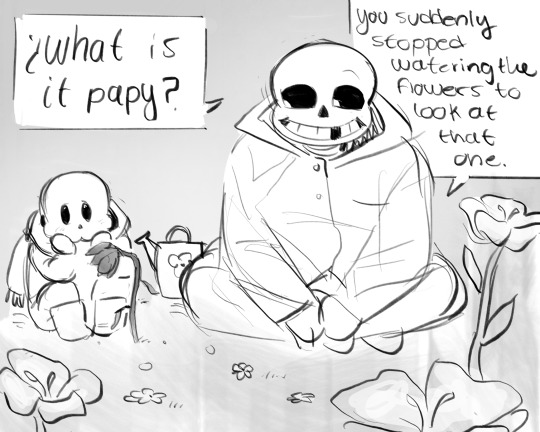

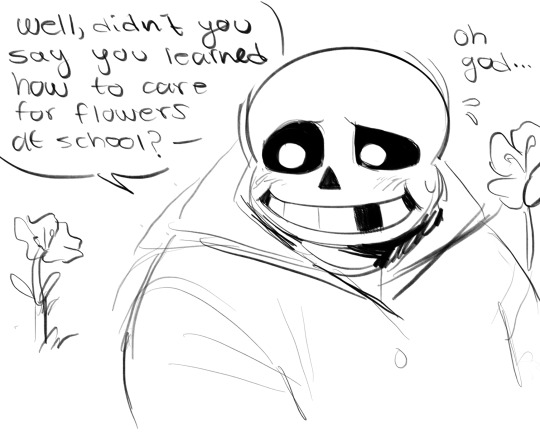






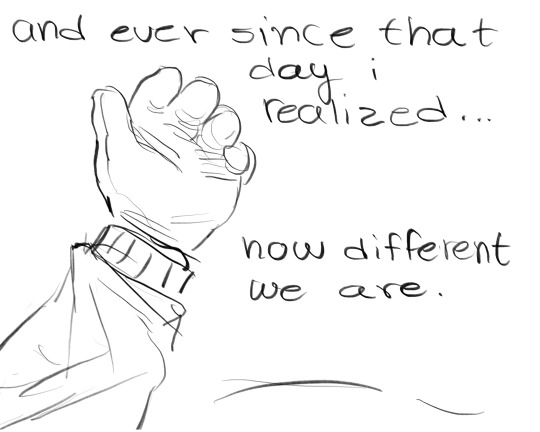
#comic#this comic is about how different the skelebros are#it makes sense to me#there are two panels that didn’t fit in this post#this comic has a lot of little meanings but I don’t know how to explain them#if you have insane reading comprehension and media literacy and a passion for character over analysis#you are going to love this#sans undertale#sans the skeleton#papyrus#sans#fanart#undertale comic#undertale#undertale fanart#skelebros
6K notes
·
View notes
Text
Learning that fans hated Applejack and called her "boring" is crazyyy to me because I genuinely, unironically believe AJ's the most complex character in the main six.
Backstory-wise, she was born into a family of famers/blue collar workers who helped found the town she lives in. She grew up a habitual liar until she had the bad habit traumatized outta her. She lost both her parents and was orphaned at a young age, having to step up as her baby sister's mother figure. She's the only person in the main gang who's experienced this level of loss and grief (A Royal Problem reveals that AJ dreams about memories of being held by her parents as a baby). She moved to Manhattan to live with her wealthy family members, only to realize she'll never fit in or be accepted, even amongst her own family. The earlier seasons imply she and her family had money problems too (In The Ticket Master, AJ wants to go to the gala to earn money to buy new farm equipment and afford hip surgery for her grandma).
Personality-wise, she's a total people-pleaser/steamroller (with an occasional savior complex) who places her self worth on her independence and usefulness for other people, causing her to become a complete workaholic. In Applebuck Season, AJ stops taking care of herself because of her obsessive responsibilities for others and becomes completely dysfunctional. In Apple Family Reunion, AJ has a tearful breakdown because in she thinks she dishonored her family and tarnished her reputation as a potential leader –– an expectation and anxiety that's directly tied to her deceased parents, as shown in the episode's ending scene. In The Last Roundup, AJ abandons her family and friends out of shame because believes she failed them by not earning 1st place in a rodeo competition. She completely spirals emotionally when she isn't able to fulfill her duties toward others. Her need to be the best manifests in intense pride and competitiveness when others challenge her. And when her pride's broken, she cowers and physically hides herself.
Moreover, it's strongly implied that AJ has a deep-seated anger. The comics explore her ranting outbursts more. EQG also obviously has AJ yelling at and insulting Rarity in a jealous fit just to hurt her feelings (with a line that I could write a whole dissection on). And I'm certain I read in a post somewhere that in a Gameloft event, AJ's negative traits are listed as anger.
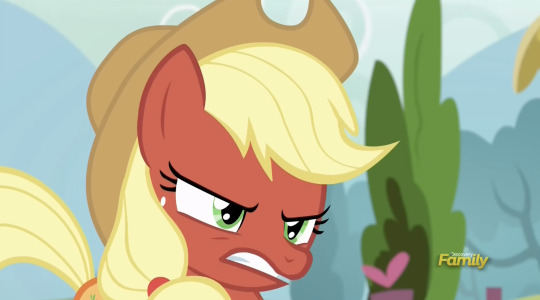
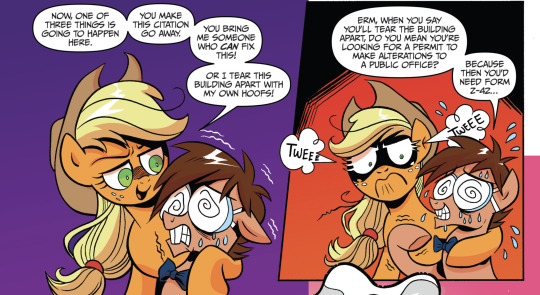
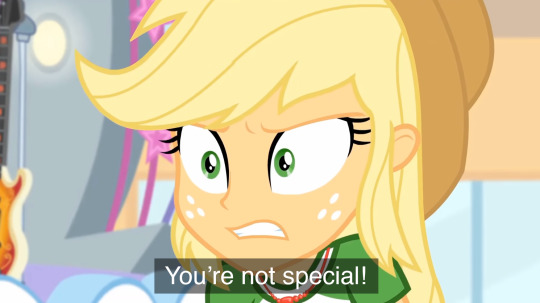
Subtextually, a lot of these flaws and anxieties can be (retroactively) linked to her parents' death, forcing her to grow up too quickly to become the adult/caregiver of the family (especially after her big brother becomes semiverbal). Notice how throughout the series, she's constantly acting as the "mom friend" of the group (despite everything, she manages to be the most emotionally mature of the bunch). Notice how AJ'll switch to a quieter, calmer tone when her friends are panicking and use soothing prompts and questions to talk them through their emotions/problems; something she'd definitely pick up while raising a child. Same with her stoicism and reluctance at crying or releasing emotions (something Pinkie explicitly points out). She also had a childhood relationship with Rara (which, if you were to give a queer reading, could easy be interpreted as her first 'aha' crush), who eventually left her life. (Interestingly enough, AJ also has an angry outburst with Rara for the same exact reasons as with EQG Rarity; jealous, upset that someone else is using and changing her). It's not hard to imagine an AJ with separation anxiety stemming from her mother and childhood friend/crush leaving. I'm also not above reading into AJ's relationship with her little sister (Y'all ever think about how AB never got to know her parents, even though she shares her father's colors and her mother's curly hair?).
AJ's stubbornness is a symptom of growing up too quickly as well. Who else to play with your baby sister when your brother goes nonverbal (not to discount Big Mac's role in raising AB)? Who else to wake up in the middle of the night to care for your crying baby sister when your grandma needs her rest? When you need to be 100% all the time for your family, you tend to become hard-stuck with a sense of moral superiority. You know what's best because you have to be your best because if you're aren't your best, then everything'll inevitably fall apart and it'll be your fault. And if you don't know what's best –– if you've been wrong the whole time –– that means you haven't been your best, which means you've failed the people who rely on you, which means you can't fulfill your role in the family/society, which makes you worthless . We've seen time and time again how this compulsive need to be right for the sake of others becomes self-destructive (Apple Family Reunion, Sound of Silence, all competitions against RD). We've seen in The Last Roundup how, when no longer at her best, AJ would rather remove herself from her community than confront them because she no longer feels of use to them.
But I guess it is kinda weird that AJ has "masculine" traits and isn't interested in men at all. It's totally justified that an aggressively straight, misogynistic male fandom would characterize her as a "boring background character." /s
At the time of writing this, it's 4:46AM.

#mlp#yeah i wrote this last night during insomnia.#yeah i know an embarrassing amount of crap about this kids show#but whatever it's my hyperfixation i'll store as much useless information as i want!!!#i'm gay and neurodivergent i have an excuse#in case you needed more proof that aj's my favorite character#personal#delete later#unless you like this analysis stuff#i get why they didn't reveal aj's parent's death until way later and why they didn't do much with it but i wish they did#cuz narratively there could've been so much material with aj's grief. like. i feel like we gloss over the fact that she lost her#mother and father as a teenager#i tried keeping my personal hcs out of this to keep it unbiased#but i'll put some in the tags#involving rarijack –– i think aj can be (but not always) very self-conscious about her relationship with rarity#anxieties that she's not the right fit or that rarity will move away and leave her some day or that another woman will take her attention#(like in rollercoaster of friendship?? nudge nudge??). basic seperation anxiety stuff#long post#regarding applebloom whenever i think about her and her parents i think about that scene in steven universe where steven looks up at#a portrait of his mother and openly wonders what kind of sack lunches she would've made for him. that episode still fucks me up
7K notes
·
View notes
Text
What About The Kens?
I'm already seeing guys complain about the Barbie movie end, how they wanted Kens to be equal in Barbieland but were only given a small part on the Cabinet.
That's the point.
You're meant to feel bad for the Kens. Believe me, women aren't partying over the 'Returns to Matriarch' ending. Some will be, but the ones who also clocked the meaning behind it won't. Most women will also feel bad for Kens. Because it's an exact parallel to how women are treated in reality.
Men, you're meant to be upset. You're meant to question it. Because you're meant to feel it, and feel what that is like, so you can finally understand women. You're upset at seeing it in a movie, now imagine living it in reality. That's being a woman.
Kens were shit on so you could feel what it was like for women this entire time. Kens were being used as a placement so you could see yourself in a woman's shoes. A world dominated by the opposite sex. When Ken leaves, and sees male presidents (All men) for the first time, men being doctors and lawyers, etc, realising he is more than just a prop for Barbie, that was on purpose. Because that is the feeling that Barbie gave to women. It's why you cheer for him at first before he goes a little overboard.
It's exactly why the real world was an exaggerated Partriarchy and Barbieland an exaggerated Matriarchy. Neither wins. Neither is equal. None of them change for the better. It's why you should want women in the real world to be respected, and Kens in Barbieland to be respected.
The thing is, women also didn't win. Not in the real world. In Barbieland, yes, but not anywhere else. The real world didn't change. But you didn't notice, did you? That Gloria (The mother that helped Barbie) also didn't get a position on the Mattel board? It was still all men? Her idea was ignored until it made a profit, and the men will likely get the credit? She'll still just be the receptionist? The women representing the real world didn't get anymore opportunities, neither did the men in Barbieland.
I was hoping that Gloria would be offered a position on the board, and that the Barbie Cabinet would introduce another entire Cabinet to represent the Kens, but neither happened. They're complete mirrors.
But which one did you actually notice? Which did you actually care about? Now tell me again the ending was unfair. Because it was. For both parties. That's the point.
The difference is, Barbieland is fictional. You will walk out of the theatre with the reassurance that at least it's not real. Women won't. Women can't. Companies not giving women equal opportunities or voices isn't fictional, and that was just one example. There are no women presidents (USA at least) for us to go look at in the real world. We don't have somewhere to go to realise it could be different for us like Ken did. Barbie and make believe is all we had when we were kids, or even now.
You're supposed to be mad, just not at the movie.
#It's going right over people's heads#I've seen men complaining about the inequality. That's the point. Now you know how it feels. Apply that same frustration#And turn it into empathy for women in reality. Because it's not nice is it?#Please for the love of God people need lessons in analysis and critical thinking#It's not a 'women just hate men and this is a women only movie'#It's please realise that you've seen what it's like to be in women's shoes. Now be the change for women that you wanted for Kens.#Barbie#Barbie Spoilers
8K notes
·
View notes
Text
OK correct me if I'm wrong, but I feel like the main 'yin/yang' parallel with Atsushi and Akutagawa is not something like 'this one is bad but secretly has a good side and this one is good but secretly has a bad side'.
I feel like it's more about 'who they are at their core vs who they choose to be'.
At his core Akutagawa is kind and at his core Atsushi is not. But despite this Atsushi tries every day to make the kinder choices and I love him so much for it. He has to work so hard to be good.
He wants to be a bitch SO bad I know he does but he tries his best to help people and be nice (sometimes he fails but that's OK <3)
Atsushi doesn't always WANT to help people, a lot of the time he's selfish and scared, but he does help people anyway. He keeps helping people over and over again. There's still some selfish motivation to it, and his initial motivation for helping people was because the headmaster told him that's all he was worth, but overall he does care about the people he helps and it weighs on him if he fails to save them. And of course, as the series goes on he starts helping people more because he can rather than because he feels like he needs to.
In Akutagawa's case, he's still capable of being kind but his environment led him into being someone who chooses to hurt people. But he's always been a protector at heart. In the start he was bad compared to Atsushi because he was choosing to hurt people and keep the cycle of abuse going. Just like how Atsushi developed in why he saved people, Akutagawa starts to get redeemed when he chooses to not just act on his rage. Not only does he start to spare people, but he speaks more kindly to them (apologising to Higuchi and telling Kyouka he's proud of her). It all culminates into the moment he chooses to help Atsushi and sacrifice himself for him, going back to his core value of being a protector. Even when he's finally revived, he keeps this role in his new position as Aya's Knight.
I kind of see the streaks of white in Akutagawa and the streaks of black in Atsushi not as their 'hidden sides' but as their fundamental selfs. That's who they are at their core, and their main colours (black for Akutagawa and white for Atsushi) are how they're presented to everyone else and how they try to have people see them as.
#I'm just spitballing half of this but these are also my genuine thoughts on these two and their yin/yang parallels#I'll never get over Akutagawa being a protector at heart and getting that side of him buried with rage from growing up in the PM and-#-Dazai's old teachings#also Atsushi being selfish at his core is very important to me. He's not a typical 'kind hearted' shonen protagonist. He's kind not because#-that's how he’s always been but because that's how he chooses to be#I think that kind of character is even more admirable to me#it also fits well with Dazai being his mentor. Since Dazai also doesn't have that initial desire to save people just out of kindness.#He saves people as a promise to his dead friend that wanted him to live a good life#in fact that actually fits with Jouno too#now that I think about it quite a few bsd characters fit into that 'not kind because they were born that way but because they chose to be'-#-archetype#hell yeah. That's kinda cool I like that#bsd analysis#Akutagawa#atsushi#akutagawa ryuunosuke#atsushi nakajima#sskk#shin soukoku#<- Not a ship post but adding this tag since I consider that their duo name too#bsd#bungou stray dogs#bungobble my post
1K notes
·
View notes
Text
Ok so I know I posted the whole set, but I keep coming back to this particular moment-

Because look at this whole situation. Aziraphale steps forward, directly into Crowley’s shadow. Not only is he getting closer, right into his personal space, but suddenly Crowley's face is going to be a lot clearer, not backlit anymore. At the same time the Crowley's hand retreats just a little from almost grabbing and dragging Aziraphale's cravat to doing a pointy finger. And then we have-

Where the eye contact is basically the most indecent thing I've ever seen. It's just... a lot.
#i'll see myself out#good omens#good omens s2#the resurrectionists#ineffable husbands#gif analysis#gif set#aziracrow#goomens#crowley x aziraphale#i am so unwell over them#a duck gifs#a duck talks
3K notes
·
View notes
Text
It kind of confuses me when I see people talking about cavaliers as if the Nine Houses have established and normalised some radical social role of human sacrifice. It really doesn't seem to me like the role of a cavalier is that simple. The only members of their society we've seen who weren't horrified by the idea were the Tridentarii.
The career soldier, who was born into the military class and trained for that role since birth, believes no necromancer should ever have to see their cavalier die. The other child soldier was killed while putting himself between his cavalier and danger. The heirophant of the Emperor's law who draws on his cavalier like a battery—a level of exploitation the other Houses condemn—turns against the will of his God when he witnesses the sacrifice expected for lyctorhood.
The deliberate sacrifice of a cavalier is not normalised. Not even in the front lines of their military. The role of a cavalier is exploitative, of course, and that's where the interesting part begins. Is it any more exploitative than a king whose knights are trained to die in battle? Than employees who are forced to work or starve? Than the existence of a noble class, or capitalism?
Human suffering exists in any society, and in most societies I know of, much of that suffering we inflict on one another through exploitation. The Nine Houses are not unique in this respect. I am very much in awe of the worldbuilding in this series, tho, that it has managed to defamiliarise human suffering and class dynamics as to show us their grotesquerie plainly without ever tipping over into anything as straight forward as direct allegory.
#like if the nine houses were just capitalist exploitation done over again in space with bones it would be a much more simple message#but no#not a whiff of capitalism to be seen#the series built its own social and class structure to explore the complexities of exploitation and status outside that framework#and then threw it in our faces to compare and contrast in Nona#the locked tomb#tlt analysis#tlt meta
581 notes
·
View notes
Text
Nuance, Narratives, and Nosferatu
As of today, Robert Eggers' Nosferatu (2024) has only been in theatres for 4 full days; and, coincidentally, that is about as long as I am able to let my thoughts marinate before they demand to be communicated. Before going into any further detail, let it be known that this film was made by freaks for freaks; it exists for the goths, the gays, the monsterfuckers, the historians, and for all those who delight in moral and thematic complexity.
With that being said - spoilers under the cut!
There are two principal narratives running through the flesh of Nosferatu, both of them rooted heavily in the cultural and literary origins of the story. It is a nightmare; it is also an erotic fantasy. It is horrifying, and it is also achingly romantic. From what I've seen so far, the vast majority of discourse that has already emerged around the film is caused by people misunderstanding or deliberately ignoring the relationship between these different lines of analysis; so please trust me when I say, from the bottom of my heart, that this duality is the very lifeblood of the movie.
The reason for that is, quite simply, that Nosferatu is a gothic horror film, set in 1830s German Confederation; and its plot relies on the same (sometimes contradictory) complexities often displayed in Victorian gothic fiction.
From the beginning of the movie, we are given to understand that Ellen Hutter met Count Orlok - the eponymous nosferatu - psychically, when she was very young. They spoke, she pledged herself to him, and was horrified to realize what she had done when he revealed his true visage to her in their first visual (and sexual) encounter.
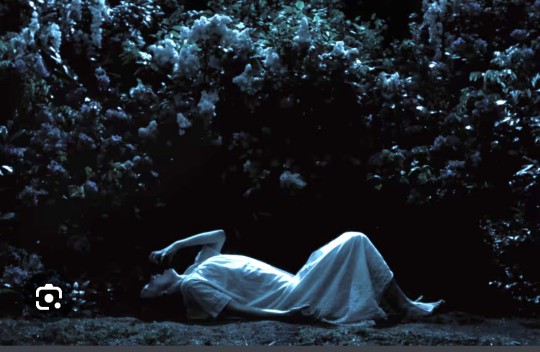
Here, under the lilacs, the paths diverge.
The first reading of the film is perhaps the more straightforward. A young girl is essentially catfished and groomed by a much older, dangerous man. When they meet for the first time, she is a teenager; the lilacs that bloom where it happens become a trigger. He is the source of her madness and "melancholy" (depression), she has nightmares about him regularly enough that her husband is aware of them, and it is implied that she has been institutionalized in the past. Thomas Hutter is the physical representation of her one desperate hope for a normal life - but as the story progresses, she finds herself being denied even that. Orlok's psychic connection with her verges on demonic possession; in chilling, The Exorcist-inspired sequences, she writhes and mutters, prophesying a city-wide reign of death and terror. In pursuit of his claim on Ellen, Orlok terrorizes her husband, murders her friends - and, eventually, she gives her life to take him with her to the grave, saving the city from the plague he caused.
That is the horror element of Nosferatu; it deals with an exploration of childhood trauma, of PTSD, of difficulties maintaining a social life after the fact. It is easy to understand even from a modern viewpoint, and it pushes the film to its conclusion with a bleak, heart-wrenching punch.
The horror is not the only element of Nosferatu.
To contextualize the alternate - though just as correct - reading of the film, it is essential to understand that Ellen’s society was extremely sexually repressed, especially in regards to female and queer sexuality.
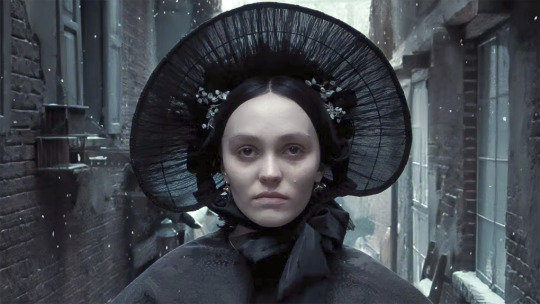
Both were severely medicalized, demonized, and restricted; and as such, when these topics do make an appearance in contemporary fiction, they are often inextricable from disgust and fear.
Dedicated as always to historical accuracy, Eggers maintains the same setting-based narrative coding.
In anticipation of morality arguments vis à vis monstrosity, depiction, and modern purity culture, let me clarify: this is something that works within his chosen genre. Horror, and especially gothic horror, invites a deeper analysis in regard to morality and motivation, and in this case, Eggers' homage to the origins of that genre grounds the narrative in its time and location, as well as fleshing it out much further than a purely modern cultural lens would permit. In this context, the details of Ellen's connection with Orlok become paramount to the understanding of the film.
As bits and pieces of their background become revealed, the audience realizes that her psychic gift did not begin with him - and neither did her melancholy, or her isolation. She was born with her abilities, and throughout her childhood, she was a bit of a tomboy by her contemporary standards, running wild in the woods near her father's property; however, once she foretold her mother's death, and once she was too old to get away with eccentricities, her father became frightened of her abnormality. She was isolated, confined indoors, and that is when her melancholy had begun. Painfully lonely and aching for some form of companionship, she called out into the ether; and Orlok responded.
Over the course of their story, he becomes the physical manifestation of everything Ellen perceives as dark and sinful about herself.
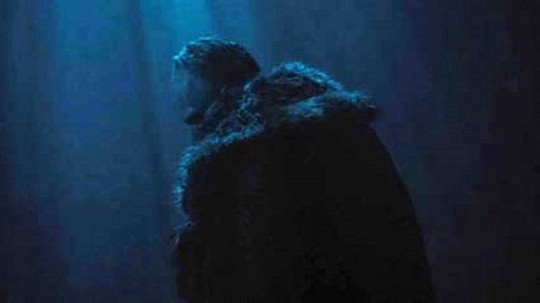
He is psychic, he is vicious, possessive, and blatantly sexual; her sensual affection with Anna parallels the evident and physical attraction he displays towards Thomas; and the social power he so easily commands is the same that she lacks, being a woman in a rigidly patriarchal society.
In the end, the severely questionable age gap, the murders, the coercion, the betrayal - all of that comes down to respect. Throughout the film, that is the one thing that Ellen is consistently denied. She is young when she meets Orlok, yes; but she is aggressively infantilized by her surrounding society even when she is a grown, adult, married woman.
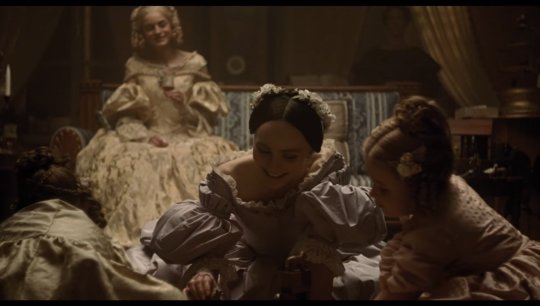
It starts from the beginning of the film, when the Hutters visit the Harding family. During those scenes, the men are shown talking business - while the women play with children in the parlour; and the same social framing persists into the body of the film. When Ellen is suffering from what appears to be some form of mental illness, she is referred to as a child by multiple different characters; and when the condition progresses, she is swiftly diagnosed with hysteria and drugged - thus being forcibly removed from the discussion of her own illness. The general reactions to that illness - which is, in fact, a display of her psychic abilities - range from annoyance to fear to curiosity; it is seen either as a disability or a curse, rather than anything entirely innate to who she is. Her fears are dismissed. Harding tells her to learn some deference. Even closer to the finale, when Von Franz admits that she could have been a great priestess in another age, he does so with pity rather than anything else; in their industrial era, he cannot help but see her only as a tragic sacrifice - horrible, but necessary to save the city from a plague. Brought in to heal her, he instead guides her to her death.
All these aspects of Ellen's circumstances find a direct opposite in her relationship with Orlok. Unlike all other characters in the film, he only ever sees her as his equal, which is made even more evident when his interactions with Thomas and Herr Knock are brought into consideration. With both men, Orlok insists on being addressed by his lordly title, "as his blood demands it"; and yet, Ellen never calls him by any title at all, be it "My Lord" or even a simple "Herr." She argues with him freely, and there is a familiarity between them that he is demonstrated to never tolerate from anyone else. Similarly, while he disguises the covenant he makes with Thomas, the terms of his covenant with Ellen are laid out clearly, in full. He does not hide from her; she already knows the worst of him, the same way he knows that she is intelligent, that she is powerful, and that she is not meant to be demure and deferring. Again and again, Orlok insists that Ellen is not meant for humanity - and the true horror, the horror she cannot bring herself to face, is that he is right.
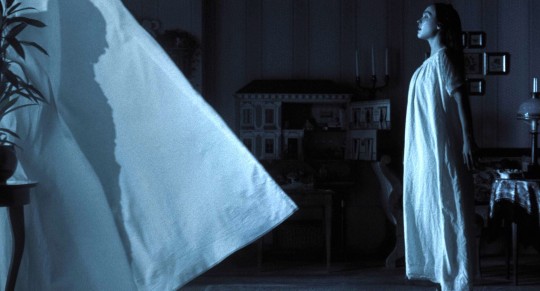
In a sense, he is a mirror held up in front of her own face. Ellen is painfully aware that she does not fit in, and that she never has. The "normal" society, epitomized by the Hardings (wealthy husband, pretty blonde wife, 2.5 kids), has no place for her - and actively dislikes her.
The film makes this ostracism impossible for the viewer to ignore. As the story progresses, it becomes evident that the other human characters - even those that do sincerely care for Ellen - never truly know her. Anna loves her, but wishes she would not talk of dreadful things - and lashes out as a result of that discomfort, scolding her. Sievers finds himself bewildered by her; Knock sees her as an object to trade; Von Franz pities her, Harding hates her, and Thomas cannot truly satisfy her, even after being touched by the supernatural himself.
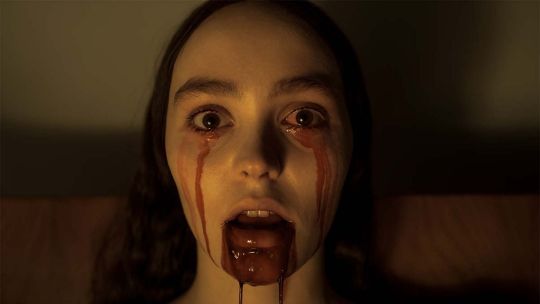
Seeing a flash of a monstrous face while they are together, he flings her away. To him, his experience with Orlok is merely traumatic, and he wishes for nothing more than to leave it behind. However, to her, it is something she cannot help but crave; and she continues to wear her lilac perfume.*
All that to say - Count Orlok is, simultaneously, everything Ellen wants and everything she is terrified of being.
That specific dichotomy reaches its climax during their mutual finale. As it is to be expected from a vampire wedding night, they rejoin in a sequence of sex, blood, and renewed vows - and what is particularly notable is that (unlike Murnau) Eggers makes it clear that this Orlok never intended to kill his Ellen, despite his inability to resist her blood. Though he drinks from her through the night, he stops at cock-crow; and she guides his head back down herself, distracting him long enough for the sun to rise. It is a duet of accident and intention. He drains her; and she holds him as the sun drains him. They cling together as they end - on a bed that serves their wedding and their death.
It is romantic. it is unquestionably romantic. However, that does not mean that the horror isn't also present; Ellen's consent, under these circumstances, is highly debatable, and Orlok is cruel, amoral, and murderously possessive. At the same time, the characters are also acting out folkloric archetypes, with precious little adjustment to that framework - which further removes them from a modern understanding of morality. He is Death, a Koschei the Deathless, a monster; she is the Maiden, a Vasilisa, a damsel. I hesitate to liken them to the Beauty and the Beast, largely because in the original premise of that story, the Beauty falls in love with the kindness that the Beast consistently displays; and it is essential to stress that Orlok has none. He does care for Ellen, in his own way, but he admits to being incapable of love as she defines it in human terms;** and, curiously, that seems to be her primary concern when it comes to the idea of accepting his proposal - rather than all the blood and carnage.
What I'm trying to say, I suppose, is that there are multiple ways of following a story, and multiple different stories in a film as nuanced as Nosferatu. Yes, it is about grooming and trauma. Yes, it is about finding love outside of the cage that is "polite society." I'm sure that it is many other things besides, with as many meanings as there are people in the theatres; after all, I am only one person, and the film grossed something over $40M in its first three days. The point is, really, that this is a story in which a rotting vampire is woken from centuries of deathlike slumber by a lonely voice asking him to be her friend; and whatever these two strange and aching souls do with that can go down any myriad of paths. The film trusts the viewer to interpret the narrative they choose.
* LILAC PERFUME - in fact, it is such a consistent favourite of Ellen's that Orlok smells it on her hair in the locket she sends with Thomas to the castle. Thomas never really learns the reason she likes that scent - even though he knows that preference well enough that he gifts her lilacs in the beginning of the film.
** ORLOK'S OBSESSION - this is a side note, but: the vampire wedding sequence reminds me strongly of the third season of NBC's Hannibal. I suppose that was to be expected, considering that Hannibal is also a Dracula offshoot, much like Orlok himself. When Ellen snaps at Orlok that he cannot love, he responds that "no; but only with you, I can be truly sated." Similarly - "Is Hannibal in love with me?" asks Will; and Bedelia responds - "Could he feel a daily stab of hunger for you, and find nourishment at the very sight of you?" I'd say if you liked that series, you should try and see the film. It works with a familiar blend of aesthetic horror.
#nosferatu#nosferatu 2024#robert eggers#lily rose depp#bill skarsgård#nicholas hoult#nosferatu spoilers#nosferatu analysis#nosferatu movie#willem dafoe#nosferatu meta#gothic horror#horror#horror film analysis#this movie respects its audience's intelligence#and that is everything to me#it doesn't spoon-feed you. it doesn't cave to over-explanation#it allows you to do the analysis yourself and read into the details#everyone say thank you robert eggers
1K notes
·
View notes
Text
Endlessly fascinated with the contrast between the (obviously) iconic Corruption Chuuya laugh and the fact that, for almost all of its use time, Chuuya remains neutral to focus/determined during Corruption:

there are actually only 2 panels where he's laughing, notably only after he's defeated his foe, before Dazai steps in:

If you watch the Dead Apple Corruption scene, Chuuya never laughs maniacally, remaining focused the entire time (as he was focused on finding Dazai instead of destroying everything around).
On other side, in Storm Bringer, we see Verlaine laugh while under Brutalization, in the middle of the action when he's already started decimating his enemies (with little resistance). His laugh is described as inhuman and compared to various powerful sounds of destruction.
Chuuya, for his part, smiles his wicked grins when the battle is at its peak with the sharing of blows, but otherwise is only described as howling and yelling (much like he was doing in Dead Apple).
I cannot argue how iconic the mad-with-power laughter of Corruption is, but I find it very interesting how we, the fandom as a whole, have fixated on such a small part of it to the point of assuming the laughter is a constant presence.
#i haven't gone insane over details in a while#my new beast is chuuya body language in the manga#i'm collecting some pictures as very scientific (coughs) research#bsd#bungou stray dogs#bsd chuuya#bsd nakahara chuuya#apparently i talk sometimes#bsd analysis
765 notes
·
View notes
Text

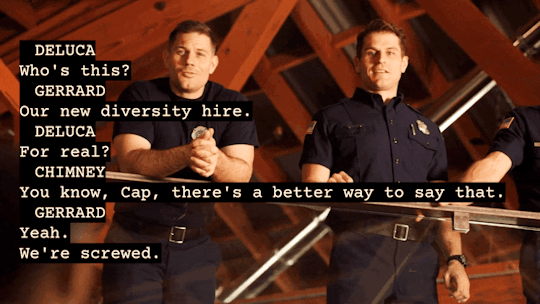

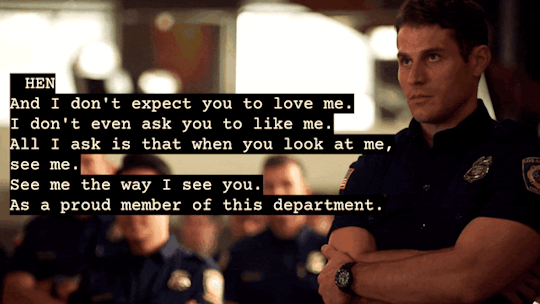




2.12 Chimney Begins - 2.09 Hen Begins - 2.16 Bobby Begins Again - 7.04 Buck, Bothered and Bewildered
Tommy's family arc
#911#911edit#911 abc#911 show#911 spoilers#911 season 7#tommy kinard#evan buckley#evan 'buck' buckley#kinley#bucktommy#kinkley#tevan#pick a ship name you guys and thanks for picking tevan the most correct name#anyway analysis time!#looking back with Modern Knowledge tm about why tommy acts the way he does in the past... babygirl you were so closeted I'm so proud#babygirl was back there getting into narnia#he was so resistant to letting go of the pseudo-family he'd found at the 118 in chimney begins#even tho it was a good old boys club that he knew he really didn't fit into he was making himself fit because at least it was something#but then he let chimney in and then hen came around and he saw a very queer person being openly queer and not giving a fuck what they think#and I think his behavior in that episode was trying to support hen as much as he could without outing himself#because like. how do you give up years of relative safety with people who do care about you they just won't like you anymore if you're *you#then he meets buck in s7 which is like 10-20 years later timeline is fake and he's like oh. this is what unconditional family is#and he's like oh. maybe I can come back. maybe I can be part of this again somehow. maybe we've both grown enough#or at the very least he'll be close to something he never believed would really happen for him#rant over tevan my beloved tim minear pillow cold both sides god bless#my edits
2K notes
·
View notes
Text
Oughh it’s 2:00 AM and I’m having Thoughts and Emotions about Marceline the Vampire Queen. Like— she’s a punk bisexual and cool as heck but she’s also a terribly sad immortal with mom issues and double dad issues BUT BUT ALL of her parental figures gave her unconditional love so strong that it fundamentally saved the human race. Marceline saved the humans who hated her because her demon dad passed on the legacy that helped her grow powerful and her mom sang her lullabies and her adopted father clung to every shred of his breaking mind to protect her childhood. She was so loved! She was so loved! And that love never went away it stayed inside her even when all three of her parents hurt her so badly that the pain stuck for a thousand years. And all of the ways they hurt her were BECAUSE they loved her, so Marceline never learned to differentiate what it meant to love someone and hurt someone. So she hurts the people she wants to protect, she’s rough with the people she wants gentleness from, she abandons the people she wants by her side. And so much of the show is her collapsing and falling apart because she can’t figure out why why her relationships are all so broken. And then little by little she gets closure with each chapter of trauma— with her demon father, with her mother’s memory, with dear Simon— which then allows her to finally be at peace with herself and accept love— pure as it is— and give it back.
#adventure time gets the congrats for writing the saddest characters in the world award#haven’t even delved into my Fern rant cause I implode each time#and Simon Betty! Ow ow ow!#Minerva…#I will never get over how intricate and human and layered and complex AT’s writing is#phenomenal speculative fiction world building and character writing#In a cartoon that set the precedent for stupid fart gags#anyways if you’ve read this far into the tags marceline is my baby girl and she really really needs a hug#marceline the vampire queen#marceline#adventure time#at#adventure time analysis
483 notes
·
View notes
Text
I feel like people have been quick to dismiss Mimzy's importance in Ep. 5

I've been seeing a lot of Mimzy hate, mainly on Reddit, where people are genuinely REALLY hating on Mimzy because she was annoying, interrupted Hell's Greatest Dad, and served no purpose in the episode.
Whilst the previous two points are down to personal taste, I feel like considering Mimzy's role in this episode nonexistent, or that she just exists for fanservice here, is greatly overlooking what this episode is about. There are two focuses to the episode, one of course being Lucifer and his relationship with Charlie, but it's also the deepest look into Alastor's actual character that we've gotten so far, I'd say significantly more than the finale. We see two sides to Alastor that both Mimzy and Luficier bring out, and I wanted to kind of highlight my thoughts and what the episode was trying to show us about Alastor that we wouldn't have gotten if Mimzy wasn't there.
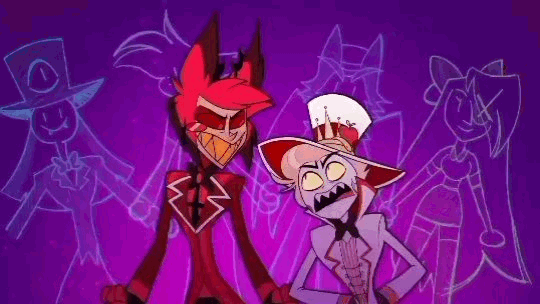
Alastor's instant hostility towards Lucifer makes it incredibly clear that Alastor can't keep his cool all the time - his two biggest flaws is that he is power-hungry and incredibly petty. From what we know - and what is likely to be true considering Lucifer is shown to have no idea who he is - Alastor has never met Lucifer before this. If the theories that he belongs to Eve/Lilith in some way are true, there is reasonable ground to say that this immediate hatred towards him could be justified, maybe it was in some way Lucifer's fault that he's caught in this deal and this is his way of taking it out on him or trying to uphold his end of that deal.
But look how much his mask slips, look how annoyed and angry he is. If this was a font that he was doing to somehow make Lucifer intentionally mad at him for some sort of personal gain, he wouldn't have looked so murderous. Him just leaning down and hissing 'fuck you' right in his face was so shocking for the audience purely because no one has done that to him before, no one has pushed him so much.
This indicates that Alastor isn't just playing some sort of game, Lucifer genuinely got under his skin, because he is so obviously more powerful than Alastor and he HATES that. He hates being reminded that he's not the biggest meanest in Hell - this was explored more in his showdown in Adam, but at the time of this episode's release, this is the most flawed and 'human' Alastor has ever felt. He's dropped from this force of mysterious evil, to randomly picking a fight with the Devil himself because he was so catty about being shown up.

As further reinforced with him snapping at Husk when he also reminded him he wasn't as all-powerful as he sees himself to be, Alastor will lash out at those who make him feel like he isn't the one in control and pulling the strings of everything - we finally see a hint of motivation for him sticking around at the hotel at all.
But then there's Mimzy.

We immediately go from seeing Alastor at his worst, at his most aggravated and petty, to seeing him literally melt into a hug. The demon who, according to Viv herself, hates physical contact so much that he would distort and melt himself to get away from it. We so quickly go from being shocked that Alastor is behaving so spitefully to now having to take in Alastor being ecstatic to see someone who he considers to be a friend.
Having this be so directly after his massive tiff with Lucifer is so important. If this wasn't included in this episode, our only insight into the person Alastor actually is would be that he's an asshole. Picking fights with people just because he wants to stay on top, that its the thing he cares about the most. But Mimzy does come along, and we see that it isn't true at all - and its confusing, and that is so perfect.
You think you're getting somewhere with the person Alastor is, but you see that, hold on, there is actually a semblance of heart in there, here he is actually caring about someone. But what is so important about this being a relationship he shares with Mimzy, and something that couldn't at all be explored with, say, Rosie, is the kind of person Mimzy is.
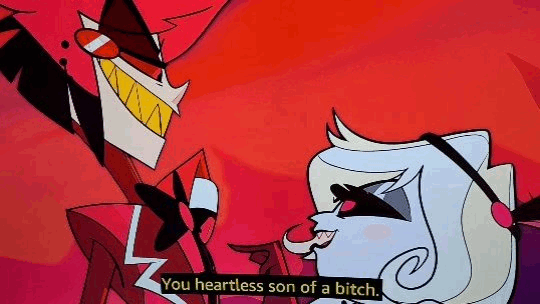
Mimzy double crossed Alastor. And, according to Husk, this is a somewhat regular occurace. We can see that Alastor is annoyed at her, and I think most of us were prepared for him to do something to her like he was doing to those loan sharks a few seconds before this confrontation.
But...he doesn't. Not at all, he doesn't even snap at her. Perhaps scold her a bit, but other than that, he is so nice to her and just politely tells her to leave and that is that. He does more shit to Lucifer, who literally hasn't done nothing but exist in his presence, than someone who just trampled all over his ego by using him, both as a shield and, well, somewhat emotionally.
In this episode, Alastor is shown to lash out. Easily. All you have to do is be more powerful than Alastor, and he won't like you - that's the impression you'd get from his scenes with Lucifer alone. But we have his scenes with Mimzy as well, and you're being told, hold on, no, that isn't quite correct, because he's not acting the same here. What has Alastor got to gain from letting Mimzy get off of this with no repercussions? Mimzy, someone who has probably sold her soul to someone else and has absolutely no power at all.
Nothing. He does it because Alastor cares about her.
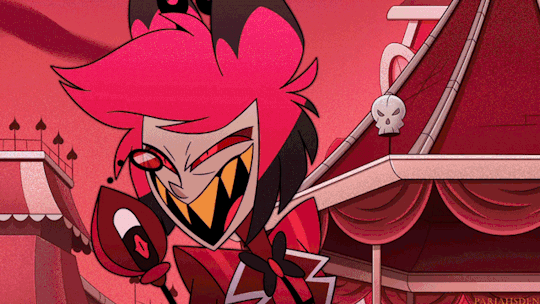
I don't think I would have considered his friendship with Rosie to be genuine at all if it wasn't for his friendship with Mimzy. Rosie is so powerful, and Alastor has so much to gain from being in close cahoots with her, but it's so clear that he doesn't care about that, but he sees her as an equal. If all we saw from Alastor in that episode was him lusting for power, it would render the way we see all his relationships with people to be of some gain to him somehow. ESPECIALLY Rosie and other Overlords like Zestial.

This makes Alastor and Mimzy's relationship arguably one of the most interesting in the show. Someone who is so powerful and unpredictable, who hardly cares for anyone other than himself, caring about this absolute gremlin of a woman. He likes Mimzy purely because she's fun to be around, a sentiment you might expect from Alastor, with his stated reasoning for joining the hotel being to laugh at people, but he's in no way laughing at Mimzy. You can tell that he doesn't intimidate her at all, because she has the absolute balls to pull off the loan shark thing with him.

Mimzy and Lucifer's interactions with Alastor has made him to be one, if not THE most interesting character in the show. Because you're exploring two contradictory sides of the same coin at once. One where he gets so worked up and angry over not having the power he sees himself as having, and one where he's visibly hurt that his long time friend used him. In one instance you have him pulling out all the stops to be as hostile as he could be to Lucifer without actually hurting him (even though he clearly wants to), and another where he has full range to hurt Mimzy as much as he wants to, but he doesn't.
Alastor cares about people. But also disregards people like playing cards. He is such a mixed bag, so far from being one note, and you wouldn't have gotten that insight without Mimzy.
#alastor#alastor hazbin hotel#hazbin hotel#mimzy#hazbin hotel mimzy#lucifer morningstar#hazbin hotel lucifer#hazbin hotel analysis#also very telling that reddit shits so strongly on one of the only plus size women in the show over her acting like a bitch in hell#you know#like so many other characters in the show
2K notes
·
View notes
Text
Exploring the Dark Side of Personal Reflection: Pitfalls and Strategies
Personal reflection is a powerful tool that allows us to examine our thoughts, emotions, and behaviors. It helps us to understand ourselves better, recognize our strengths and weaknesses, and make positive changes in our lives. However, while personal reflection can be a positive force for self-improvement, it also has a dark side. In this article, we will explore the dark side of personal…
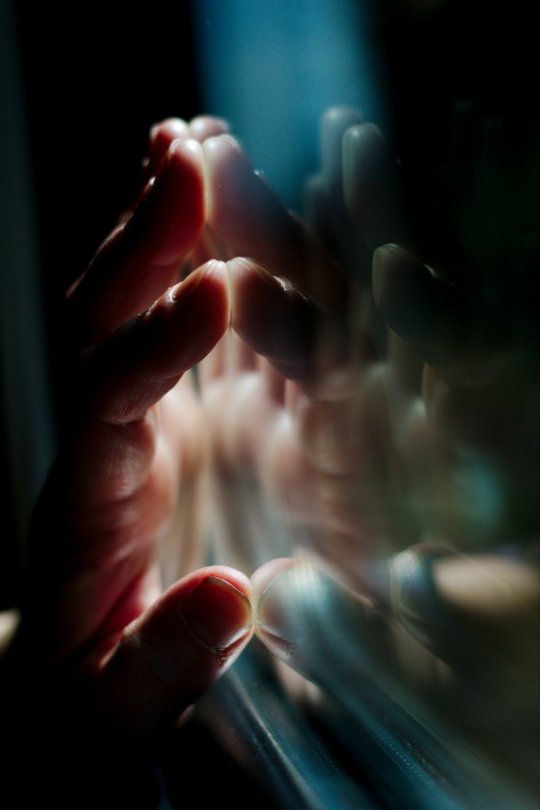
View On WordPress
#growth mindset#negative self-talk#over-analysis#perfectionism#Personal reflection#rumination#self-criticism#Self-improvement
0 notes